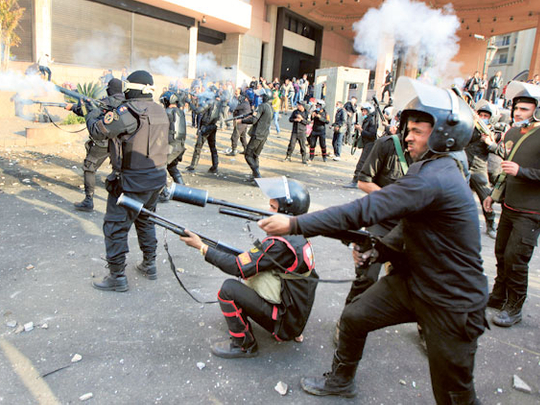
Cairo: In an apparent reaction to the West’s pressure on him to introduce democratic reforms, the now-toppled Egyptian president Hosni Mubarak used to warn that his regime’s fall would be followed by chaos.
Two years after Mubarak’s ouster, Egyptians reconsider the former strongman’s warning. Although Egypt has its first democratically elected president, the country has been gripped by political turmoil, security breakdown and economic decline for most of the past two years.
Earlier this month, Defence Minister Abdul Fattah Al Sissi warned that disagreements among political forces could result in the “collapse of the state”. His warning was made in the backdrop of a sharp dispute between the Islamist President Mohammad Mursi and the secular-minded opposition.
Mursi, who hails from the powerful Muslim Brotherhood, was elected in June last year after a run-off vote with Ahmad Shafiq, Mubarak’s last premier.
On June 30, Mursi took power from army generals who had ruled the country since Mubarak’s overthrow on February 11, 2011. A few weeks after his inauguration as president, Mursi infuriated the judiciary by reinstating the lower house of parliament, invalidated by the Supreme Constitutional Court. The top court annulled Mursi’s decree and confirmed the dissolution of the legislature where his Islamist allies had a clear majority.
Tightening power
In a bid to tighten his hold on power, Mursi sacked the ex-ruling military leader Hussain Tantawi and Sami Anan who were holding the influential posts of the defence minister and army chief respectively. The surprise move caused no trouble among the junior military, who regarded Tantawi and Anan as part of the Mubarak regime.
However, Mursi came under scathing criticism from the opposition and the judiciary in November when he granted himself sweeping new powers and decreed that all his decisions be beyond judicial oversight. He also fired the Mubarak-era top prosecutor in a way seen by judges as violating the independence of the judiciary.
The opposition branded Mursi as a Mubarak-like autocrat and organised mass protests against the measures.
Tensions mounted as Mursi ignored a demand by the opposition to re-form a constituent assembly tasked with drafting the country’s first constitution after Mubarak’s toppling. Detractors said the commission was not a true representative of all Egyptians as it was dominated by Islamists.
The bulk of liberal and Christian members of the panel quit, claiming that their views on the draft had been overlooked. Yet, the assembly finished its work and rushed through the draft in a marathon televised session that lasted 18 hours.
Nation polarised
The procedure further incensed the opposition, which argued that the charter was heavily “Islamised” and undermined fundamental rights. The document polarised the nation and triggered violent street protests. Ten people were killed in clashes between Mursi’s backers and opponents outside a presidential palace in eastern Cairo in December.
Mursi set December 15 as the date for holding a referendum on the draft constitution. However, he had to distribute voting across two days after many judges decided to boycott overseeing the referendum in a protest of Mursi’s moves. The opposition, led by the National Salvation Front, urged supporters to reject the draft.
The document was approved by 64 per cent of the voters who cast their ballots. The opposition, meanwhile, claimed the polls had been marred by massive fraud.
The political turmoil forced the Islamist-backed government to delay talks with the International Monetary Fund for a $4.8 billion loan to prop up the country’s finances. The Egyptian pound slipped to a 10-year low against the dollar, as the country’s vital tourism industry further suffered due to lack of street security.
Accusing Mursi of tightening the Brotherhood’s grip on power, the opposition staged massive protests on January 25, marking the second anniversary of the revolt against Mubarak. The protests turned violent, leaving 62 people dead in Cairo and the flashpoint Suez Canal cities.
Going the Mubarak way?
Mursi appeared on state television, vowing firmness against what he termed “rioters and counter-revolutionaries”. He also imposed a night-time curfew and a state of emergency on the three Suez Canal cities — measures often invoked by Mubarak.
Egypt has been hit in the past two weeks by violent protests, even reaching the doorstep of the presidential palace, which used to be a no-go area for ordinary people under Mubarak’s 30-year rule.
The divide is seen as growing between Mursi and the opposition, which accuses him of betraying the revolution. Mursi’s Islamist allies, meanwhile, accuse his opponents of planning his ouster.












